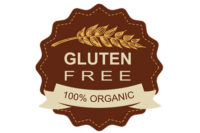This month marks National Celiac Awareness Month, a time dedicated to raising awareness of a condition affecting approximately one percent of the U.S. population. Because there’s been growing interest and media attention surrounding gluten-free, especially as a fad diet, we at the Grain Foods Foundation are working to change perceptions of it. This is especially crucial because there are a number of drawbacks, like weight gain and nutrient deficiencies, to following the diet if not medically necessary. We want to underscore that Celiac is a serious disease and turning its treatment, a gluten-free diet, into a fad paints a completely inaccurate picture of what is a legitimate medical therapy. In light of this, I’d like to use this month’s column to overview the disease and the gluten-free diet.
Those suffering from Celiac disease, an autoimmune disorder, experience intestinal damage when they consume gluten, a type of protein found in wheat, rye and barley. Given this, the only treatment for the disease is a strict gluten-free diet for life. Another group requiring the gluten-free diet is individuals with non-Celiac gluten sensitivity, who also experience negative symptoms like abdominal pain when they ingest gluten. This condition is estimated to affect six percent of the U.S. population.
According to research from Packaged Facts, the gluten free-product market has experienced tremendous growth and is expected to exceed $5 billion by the year 2015. This growth reflects increased awareness and diagnosis of Celiac disease and gluten-sensitivity; it also demonstrates the increase of gluten-free as a fad diet which many of us have read about in the media, especially when it’s the latest diet lauded by celebrities.
It goes without saying the gluten-free movement presents some complex issues for our industry; GFF is constantly working to promote a commonsense approach that acknowledges the severity of Celiac disease yet discourages the average, healthy consumer from going gluten-free. Getting tested for Celiac disease before trying the gluten-free diet is the cornerstone of our messaging; many consumers self-diagnose and put themselves on the gluten-free diet without realizing this choice can later affect the accuracy of testing. In fact, people who suspect they have Celiac but who started g-free have to reintroduce gluten for weeks or months to reignite symptoms and get an accurate diagnosis.
The average consumer is largely unaware of this relationship, but in order to accurately benchmark consumer perceptions of Celiac and the gluten-free diet, we conducted a survey with research firm, Harris Interactive, which gathered data from more than 2,000 U.S. adults. Interestingly enough, about six percent of respondents were currently following or had followed the gluten-free diet, a rate which is consistent with prevalence rates of Celiac and gluten-sensitivity. However, around half of the participants considered “to feel better” as a reason for following the gluten-free diet and one-quarter named it a “diet for losing weight.”
Given these responses, our educational outreach is focused on reinforcing the medical reasons for going gluten-free, the drawbacks of the diet as well as the importance of testing before dieting. With the help of GFF advisory board member and gluten-free expert, Shelley Case, we are conducting a media outreach throughout the month to bust these misperceptions.
Posts on our social media channels will be dedicated to gluten-free education and engaging influencers in discussions about the diet. We have also enlisted advisory board chairman and researcher, Dr. Glenn Gaesser to conduct a literature review on the gluten-free diet regarding the evidence supporting indications for its use; it has been submitted to a handful of peer-reviewed journals, and we’re looking forward to announcing its publication in the coming months. Finally, we continue to coordinate our efforts with other leaders in the field. This winter, we met with international gluten-free expert, Dr. Alessio Fasano, and his staff at the University of Maryland Center for Celiac Research to discuss the latest research and prioritize the issues related to gluten-free.
The gluten-free boom presents another opportunity for GFF to insert itself in the national health dialogue. While this movement means some challenges for the industry, rest assured we are hard at work disseminating credible, science-based information to consumers and influencers alike, not only during Celiac Awareness Month, but all year long.



